The Cost of Responsible Pet Ownership:
What You Need to Know
Pets cost money. That fact makes owning a pet a privilege that comes with great responsibility. February is Responsible Pet Ownership Month, a perfect time to reflect on what it takes to care for your pet's health, safety, and well-being. Pets bring joy and companionship, but they are also a financial commitment. Let's break down what you need to know when it comes to the cost of being a responsible pet owner.

The Cost of Responsible Pet Ownership
The easy part about owning a pet is showering them with love, but pets are also a financial commitment. Talking about pets and money can be a tough topic and not always a fun conversation to have with pet owners.
Being a responsible pet owner means understanding what it will cost to own a pet, making a plan for those expenses, and recognizing that these costs play a vital role in keeping your pet healthy and happy. These expenses can add up quickly, from food and treats to toys to vet visits.
Upfront Costs
The initial cost of bringing a pet into your home can vary significantly depending on whether you adopt from a shelter or purchase from a breeder. If you're set on a specific breed, you may need to budget for a higher price tag. To help you make an informed decision, check out our blog on how to pick the right breeder. Either way, it's essential to be prepared for this upfront expense.
Before your pet comes home, you must invest in essentials like food bowls, bedding, leashes, toys, and crates. These items help your pet settle into their new environment and ensure their safety and comfort from day one.

Dogs and cats are also naturally curious, so they'll explore and sometimes get into things they shouldn't. Take the time to pet-proof your home by installing pet gates, removing hazardous products, being mindful of toxic houseplants, and opting for pet-safe cleaning supplies. Learn more about common pet poisons and how to keep your pet safe by reading our blog on pet poison prevention tips.
Before bringing your pet home, you'll also need to choose a veterinarian and get estimates for exams, vaccines, spay/neuter, monthly preventatives, and other health needs.
Please see this resource to learn more about average veterinary costs - Average Veterinary Pricing by Procedure.
Ongoing Costs
Once your pet is home and settled in, it will continue to incur ongoing, yearly costs. These costs are necessary for the overall health and well-being of your pet and ensure the quality of its life.
One of your pet's most significant ongoing costs is trips to the vet. Your pet should have an annual vet exam if not bi-annual exams. Pets age faster than we do, and things can change quickly. These exams help us stay current on your pet's health and catch potential issues early.

Ongoing vet costs include vaccines, fecal exams, lab work, parasite prevention, and dental care. Dental health is crucial for your pet's overall well-being, not just for fresh breath, but because poor oral hygiene can lead to serious systemic issues, affecting organs like the heart, kidneys, and liver. While dental cleanings can seem costly, investing in your pet's dental care can prevent more expensive and severe health problems down the road, improving both the quality and length of their life.
All of these ongoing costs, including dental care, are essential for your pet's quality of life and longevity, so it's important to plan ahead. To help you budget for these expenses, check out this article of an Expert Guide to Creating a Pet Budget.
Unexpected Costs
Along with ongoing costs, a pet budget should include unexpected medical expenses such as surgeries, illnesses, and emergencies. Responsible pet ownership includes knowing what actually constitutes an emergency.

Ear infections, UTIs, and skin infections usually require urgent care, not an ER visit. Schedule a vet appointment early in the week to avoid unnecessary ER trips. Don't adopt a "wait-and-see" approach. If your dog has diarrhea and vomiting on Monday, call the vet right away. You can always cancel if your pet improves, but being proactive helps prevent serious emergencies.
Emergencies include situations like seizures, bleeding, loss of limb, unconsciousness, or difficulty breathing. Emergency veterinary hospitals play an essential role but should be used when warranted, as they come with long wait times and higher costs.
It's necessary to think about the possibility of these emergencies. What if your pet gets sick because they got into a bag of chocolate or eats something they shouldn't and needs abdominal surgery? What are you going to do? Can you afford that? While these are worst-case scenarios, they are emergencies that are 100% possible.
Senior Pets
As our pets age, they start to incur additional costs. Chronic conditions, pain relief, and end-of-life decisions often require significant financial resources. Routine blood work, specialized diets, and long-term medications can add up quickly.
End-of-life care, such as hospice or euthanasia, is another reality that pet owners must prepare for emotionally and financially. Planning ahead and setting aside funds can make a big difference in ensuring your pet's comfort and happiness during their later years.
Paying for Your Pet's Care
Once you commit to owning a pet, it's a lifelong responsibility. Planning ensures you're ready to provide the care your pet deserves for all the costs, both ongoing and expected, as well as the unexpected.
Here are some strategies to help you prepare:
Read more here on how these strategies can benefit both you and your pet with a pet care plan through your local vet or at Buddy's Vets.
The True Cost
Being a responsible pet owner requires a significant financial investment, but the rewards are worth it. Pets are a lifetime commitment that demands a proactive approach to their health and well-being. Setting realistic expectations about the financial costs is essential to ensure your pet's long, healthy, and happy life. By investing in their care, you're enhancing their quality of life and strengthening the bond you share. With thoughtful planning, you can navigate the costs of responsible pet ownership and fully embrace the joy that comes with caring for your pet.
